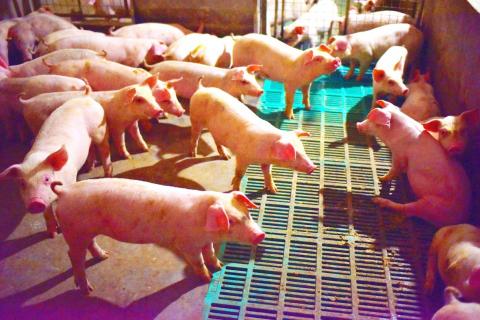An outbreak of African swine fever in China might spread to other parts of Asia, the UN Food and Agriculture Organization (FAO) said yesterday, as the world’s largest pork producer scrambled to contain the disease.
China has culled more than 24,000 pigs in four provinces to stop the disease from proliferating, the FAO said in a statement.
The FAO said the cases have been detected in areas more than 1,000km apart, meaning it could cross national borders.

Photo: AFP
“The deadly pig virus may spread to other Asian countries any time,” the FAO said.
The “diverse geographical spread of the outbreaks in China have raised fears that the disease will move across borders to neighboring countries of Southeast Asia or the Korean Peninsula, where trade and consumption of pork products is also high,” it added.
China reported its first case of the disease in northeastern Liaoning Province earlier this month.
Last week, the eastern city of Lianyungang announced that it had culled 14,500 pigs to check the disease’s spread.
“The movement of pig products can spread diseases quickly and, as in this case of African swine fever, it’s likely that the movement of such products, rather than live pigs, has caused the spread of the virus to other parts of China,” FAO chief veterinarian Juan Lubroth said.
African swine fever is not harmful to humans, but causes hemorrhagic fever in domesticated pigs and wild boar that almost always ends in death within a few days.
There is no antidote or vaccine, and the only known method to prevent the disease from spreading is a mass cull of the infected livestock.
In a report to the World Organisation for Animal Health, Beijing said an emergency plan had been launched and control measures taken to halt the spread of the disease.

Taiwan is gearing up to celebrate the New Year at events across the country, headlined by the annual countdown and Taipei 101 fireworks display at midnight. Many of the events are to be livesteamed online. See below for lineups and links: Taipei Taipei’s New Year’s Party 2026 is to begin at 7pm and run until 1am, with the theme “Sailing to the Future.” South Korean girl group KARA is headlining the concert at Taipei City Hall Plaza, with additional performances by Amber An (安心亞), Nick Chou (周湯豪), hip-hop trio Nine One One (玖壹壹), Bii (畢書盡), girl group Genblue (幻藍小熊) and more. The festivities are to

Auckland rang in 2026 with a downtown fireworks display launched from New Zealand’s tallest structure, Sky Tower, making it the first major city to greet the new year at a celebration dampened by rain, while crowds in Taipei braved the elements to watch Taipei 101’s display. South Pacific countries are the first to bid farewell to 2025. Clocks struck midnight in Auckland, with a population of 1.7 million, 18 hours before the famous ball was to drop in New York’s Times Square. The five-minute display involved 3,500 fireworks launched from the 240m Sky Tower. Smaller community events were canceled across New Zealand’s

‘IRRESPONSIBLE’: Beijing’s constant disruption of the ‘status quo’ in the Taiwan Strait has damaged peace, stability and security in the Indo-Pacific region, MOFA said The Presidential Office yesterday condemned China’s launch of another military drill around Taiwan, saying such actions are a “unilateral provocation” that destabilizes regional peace and stability. China should immediately stop the irresponsible and provocative actions, Presidential Office spokeswoman Karen Kuo (郭雅慧) said, after the Chinese People’s Liberation Army (PLA) yesterday announced the start of a new round of joint exercises around Taiwan by the army, navy and air force, which it said were approaching “from different directions.” Code-named “Justice Mission 2025,” the exercises would be conducted in the Taiwan Strait and in areas north, southwest, southeast and east of Taiwan

UNDER WAY: The contract for advanced sensor systems would be fulfilled in Florida, and is expected to be completed by June 2031, the Pentagon said Lockheed Martin has been given a contract involving foreign military sales to Taiwan to meet what Washington calls “an urgent operational need” of Taiwan’s air force, the Pentagon said on Wednesday. The contract has a ceiling value of US$328.5 million, with US$157.3 million in foreign military sales funds obligated at the time of award, the Pentagon said in a statement. “This contract provides for the procurement and delivery of 55 Infrared Search and Track Legion Enhanced Sensor Pods, processors, pod containers and processor containers required to meet the urgent operational need of the Taiwan air force,” it said. The contract’s work would be